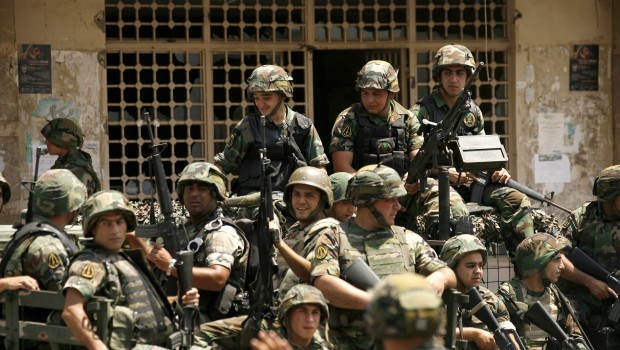
Lebanese Army commandos sit on the back of a truck in the Abra district of the southern city of Sidon, on June 26, 2013, following 24-hours of clashes that ended two days ago between the Lebanese army and supporters of radical Sunni cleric Sheikh Ahmad al-Assir. (AFP PHOTO/MAHMOUD ZAYYAT.)
Beirut, Asharq Al-Awsat—Worried about the possible fallout from Syria, the Lebanese military spared no efforts to crush the armed insurgency led by Sunni Sheikh Ahmed Al-Assir; however, it remained heedless to the risks of Hezbollah’s growing embroilment in civil-war torn neighbor, Syria, prompting accusations of double-standards.
Using a bellicose tone, the Sunni preacher, Sheikh Salim Al-Rafei said: “We feel that the Sunni sect is marginalized” accusing the military of “conspiring with Hezbollah to kill [Sunnis]” in Abra district. The sheikh continued that “what happened in Abra was an Iranian plot.”
For his part, Fayez Ghosn, the Lebanese defense minister in the caretaker Lebanese government, confirmed that “decisions are usually made following consultations between the military leadership and the acting government.”
“Lebanon is in need of political consensus to curb the spread of terrorism and extremism,” he said, adding “the forthcoming days will be difficult for Lebanon.”
Ghosn stressed that the Lebanese military represents all citizens and should not be “aligned with one side,” adding that it “brooks no interference compromising national security.”
Speaking exclusively to Asharq Al-Awsat, the director of the Beirut-based Centre for Middle East Studies, Dr. Hisham Jaber, said that the military aims to prevent violations against national security and the Syrian crisis from being transferred to Lebanon.
The retired Lebanese Major General said that ensuring internal stability is among the tasks of the military. However, it should not take part in the political developments in the country. “[The military] represents homeland,” Jaber added.
Over the last couple of years, the task of ensuring internal security have fallen to the Lebanese military, heavily deploying its units in several hotspots across Lebanon, from the streets of Beirut, Sidon to the Syrian borders. The Lebanese military have recently engaged in violent clashes with supporters of Ahmed Al-Assir, the Sunni cleric, in Sidon and Tripoli.
The military will be exhausted if the state of turmoil continues as “pursuing militants is not the task of the military rather of the security forces,” Jaber continued. “The Lebanese military can tackle security issues, yet it is not its job to defuse tensions caused by political problems;” rather, “it is the government’s job,” he added.
The security apparatus in Lebanon which consists of approximately 27,000 personnel cannot undertake the task of ensuring security and stability, as well as protecting politicians and pursuing insurgents, among others, Jaber said.
Concerned over the shortages in weaponry, the Lebanese defense minister announced that some of the weapons seized from insurgents are even more sophisticated than the Lebanese army’s arsenal, in a reference to the pro-Assir insurgents in Sidon. This is to say nothing of Hezbollah’s arsenal.
The latest weapon shipment the Lebanese military have received was in 1985 when the then president Amine Gemayel signed a deal with the US to import tanks, armored personnel carriers, as well as individual weapons and medium machine guns.
Commenting on the Lebanese military arsenal, Jaber said that a comprehensive plan should be drawn up to provide the Lebanese military with new weaponry, including “sophisticated ground weapons, air and marine forces.”
“The Lebanese air forces are very weak, [consisting of] a small number of helicopters which are used for carrying troops and reconnaissance,” Jaber said, adding that “the marine forces are very old and it was provided with new British military boats in 1991.”
According to Jaber, the Lebanese military will need USD 5 billion worth of weapons, from sophisticated ground weapons to an air defense system.
The Obama administration recently announced it would extend military aid for the Lebanese army amid public divisions in Lebanon over the military institution’s handling of the recent turmoil in Sidon.
Jaber denies accusations against the military, saying that “the supreme commander of the army is the president who I do not think is currently on good terms with Hezbollah.” “Jean Kahwaji, the chief of the Lebanese armed forces, is not affiliated with the military school of the party [Hezbollah] or its sect,” he added.
It is noteworthy that the Lebanese military has never been an object of suspicion throughout the last decade, enjoying a huge public support in the fierce wars it waged against radical Islamist groups, such as Fatah Al-Islam group in 2007.
The Lebanese army consists of approximately 40,000 officers and soldiers. The leadership of the army is assigned in accordance with sectarian quotas and criteria, with a Maronite army commander and a Druze chief-of-staff.
It is estimated that the 65 percent of the army are Muslims, both Sunnis and Shi’ites, while Christians comprise 35 percent.
